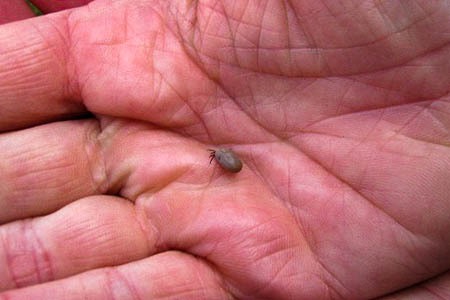A mountain expert is urging outdoor enthusiasts to check for ticks after a camping trip left her with a number of unwanted guests.
Heather Morning, mountain safety adviser with the Mountaineering Council of Scotland said the recent mild winter has led to an increase in the number of the nasty parasites.
Ticks attach themselves to the body after lurking in vegetated areas. Ms Morning said the small arthropods, related to spiders and scorpions, are particularly suited to mild damp climates and therefore thrive in the west coast mountain regions of Scotland.
As well as being a nuisance, ticks carry diseases, including Lyme disease which can be extremely serious if not diagnosed early, she said.
She said: “Last weekend we enjoyed a camping trip over in Moidart in the most stunning weather.
“Relaxing at the campsite after a day on the hill, we noticed several ticks on our feet and during the following week found several latched onto our bodies even though we had thoroughly checked ourselves when we got home.
“The dog didn’t escape either; we have been removing engorged ticks from her for several days now.”
Ms Morning recommends that hillwalkers are vigilant and take some simple precautions such as tucking trousers into socks or wearing gaiters when on the hill.
It’s also well worth taking a good look at yourself when you return home to spot the ticks before they latch on. From experience, they seem to appear even a few days later, she added.
If you find one attached to you, remove with a tick hook. If in doubt seek advice from your doctor.

Joanne Drayson
09 May 2014Thank you for raising awareness of the possibility of Tick Borne Disease.
Public Health England are now working closely with charity Lyme Disease Action and in a recent notice actually directed enquiries to LDA website.
You may not be aware but LDA was involved with James Lind Alliance research that found many uncertainties in diagnosis and treatment of Lyme Disease as a result PHE are to revise their guidance but this will take some time.
Currently the most comprehensive information is on the lyme Disease Action website perhaps you would be good enough to add a link to your blog post for readers to seek further information.
Joanne Drayson
09 May 2014http://www.lymediseaseaction.org.uk/
I am not sure if you allow links on your comments but this is to the Lyme Disease Action website
Ben Stobbs
09 May 2014I was on the Knoydart peninsula the same weekend, the lower slopes of Corbett Beinn Buidhe were infested. I had to keep dusting them of my legs every 5 mins or so on the ascent, some were difficult to see being smaller than a pinhead. Had a cracking day in great weather though!
kitty
10 May 2014i got one of these little buggers on my rib last year when i was suffering from something else. We bought a tick remover from Pets at home for a couple of quid and it dealt with it swiftly and safely, this was after seeing the doctor who said put Vaseline over it and suffocate it, but apparently its the worst thing to do as just before they suffocate they vomit poisons into the system that can be very harmful.